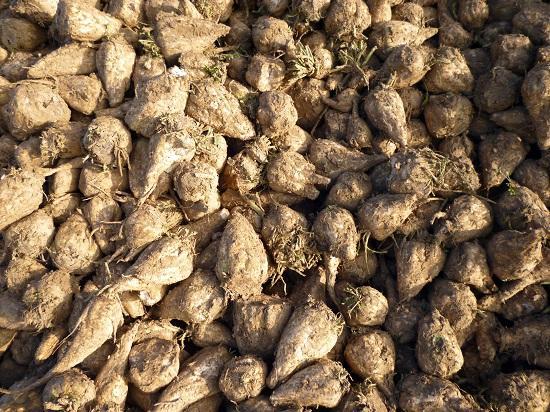Emergency Pesticide Authorisation To Protect Sugar Beet Crop Conditionally Approved
5th March 2024

The pesticide will only be used if there is a threat to the crop, and stringent controls are attached to protect the environment.
The threshold for neonicotinoid use has increased on previous years to the highest level it's ever been set.
The government is committed to finding innovative solutions to manage pests and promote food production while protecting the environment.
A neonicotinoid pesticide will be permitted for use on the 2024 sugar beet crop in England, only if there is a danger as evidenced by an independent prediction of virus incidence of 65% or more.
Emergency Authorisations for pesticides are only granted for a limited period of time, in special circumstances where it is necessary because of a danger that cannot be contained by any other reasonable means, and the use is limited and controlled.
Use of Cruiser SB will be permitted if levels of yellow virus are predicted by an independent model to exceed a particular threshold. If this threshold is not met, use of the product will not be permitted.
This year's threshold for use is at the highest level it has ever been set. Even if the threshold is passed, further conditions will be applied to minimise the risk to the environment.
This includes restrictions on the crops which farmers can plant in subsequent years in any field where treated seed has been used, and compliance with the stewardship scheme to treat and use seed correctly and to monitor the level of neonicotinoids in the environment.
The application of the neonicotinoid pesticide protects crops against viruses to safeguard food production, while the threshold attached to its application helps protect the wider environment.
The government is committed to moving away from pesticide use and is supporting innovative methods to support land farmers effectively manage pests. Even if Cruiser SB were to be used on every sugar beet field in England, the amount of active substance would still be over 90% lower than the quantity of neonicotinoids applied to crops in each of the years 2012 to 2016.
Sugar beet seedlings and young plants are vulnerable to feeding by aphids which transmit viruses leading to reduced beet size and lower sugar content. The viruses can reduce yields up to 50%, impacting individual growers, domestic sugar production and an industry which sustains almost 10,000 jobs across the country.
More than half of the UK's sugar comes from domestic production and in 2020, 25% of the national sugar beet crop was lost, costing £67 million of total economic loss across the industry.
Farming Minister Mark Spencer said:
We recognise the damaging impact that an outbreak of beet yellow virus could have on farmer livelihoods. We therefore regard issuing an emergency authorisation as a necessary and proportionate measure.
The product can only be used if a threshold is met, and its use will be strictly controlled. This decision is based on robust scientific assessment and the risks have been evaluated very carefully.
Sugar beet plants are harvested before they flower and do not generally exude through leaves or stems. Given this, the sugar beet crop itself is considered to be unattractive to bees, and there is little risk arising from bees foraging on pollen and nectar of the sugar beet crop.
The Government recently held a roundtable with members of the British sugar industry and environmental organisations during which the industry's plan to move away from neonicotinoid use was discussed. The Farming Minister urges the applicants and others in the sector to drive forward these plans, including measures to improve seed germination, so that their outputs can be implemented in the field at pace.
The government has also set out actions to increase the use of Integrated Pest Management in agriculture. This includes new paid actions as part of the Sustainable Farming Incentive Scheme, such as an option to move to insecticide-free farming.
These actions will support farmers to increase their use of Integrated Pest Management solutions, thereby reducing the risks associated with pesticides, combatting pesticide resistance, and supporting sustainable agricultural productivity.
The Farming Minister considered advice on this application from Defra's Chief Scientific Adviser, the Health and Safety Executive, the independent UK Expert Committee on Pesticides and economists.
The UK's approach to emergency authorisations has not changed following our departure from the EU and the overall ban on the use of neonicotinoid pesticides remains in place.
To read the statement of reasons, visit: [b]Neonicotinoid product as seed treatment for sugar beet[/b : emergency authorisation application 2024 - GOV.UK
Defra approved an emergency authorisation for neonicotinoid use in 2023 with a virus incidence threshold of 63% or above; in 2022 the virus incidence threshold was set at 19% or above.
The decision applies to England only.
Update March 2024: On 1 March we received the model's forecast for 2024, which predicted an incidence level of 83%. This means that British Sugar will treat sugar beet seed with Cruiser SB and distribute it to the growers who have ordered it for use on this year's sugar beet crop.
Note
This pesticide has been banned in the UK since 2018 but has been approved for use on sugar beet crops in England. This announcement comes despite an industry commitment to end reliance on the banned pesticide by 2023.
Are bees killed by neonicotinoids?
Neonicotinoid residues found in pollen and nectar are consumed by flower-visiting insects such as bees. Residue concentrations can reach levels that cause sublethal effects through a variety of application methods, including use of coated seed, and in some situations can reach lethal levels.
How long do neonicotinoids last?
Persistence in soils, waterways, and nontarget plants is variable but can be prolonged; for example, the half-lives of neonicotinoids in soils can exceed 1,000 days, so they can accumulate when used repeatedly. Similarly, they can persist in woody plants for periods exceeding 1 year.
